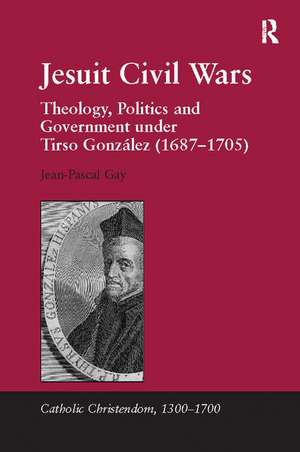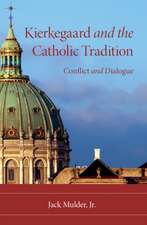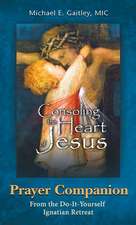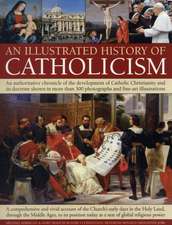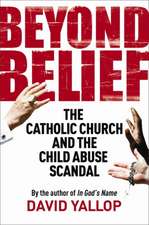Jesuit Civil Wars: Theology, Politics and Government under Tirso González (1687-1705): Catholic Christendom, 1300-1700
Autor Jean-Pascal Gayen Limba Engleză Paperback – 24 mai 2017
| Toate formatele și edițiile | Preț | Express |
|---|---|---|
| Paperback (1) | 465.39 lei 6-8 săpt. | |
| Taylor & Francis – 24 mai 2017 | 465.39 lei 6-8 săpt. | |
| Hardback (1) | 1119.45 lei 6-8 săpt. | |
| Taylor & Francis – 28 mai 2012 | 1119.45 lei 6-8 săpt. |
Din seria Catholic Christendom, 1300-1700
- 9%
 Preț: 1038.14 lei
Preț: 1038.14 lei - 15%
 Preț: 269.84 lei
Preț: 269.84 lei - 18%
 Preț: 1000.27 lei
Preț: 1000.27 lei -
 Preț: 388.13 lei
Preț: 388.13 lei -
 Preț: 416.22 lei
Preț: 416.22 lei - 28%
 Preț: 825.06 lei
Preț: 825.06 lei -
 Preț: 416.22 lei
Preț: 416.22 lei -
 Preț: 469.34 lei
Preț: 469.34 lei - 18%
 Preț: 1055.69 lei
Preț: 1055.69 lei - 18%
 Preț: 1054.71 lei
Preț: 1054.71 lei - 18%
 Preț: 1060.25 lei
Preț: 1060.25 lei - 18%
 Preț: 1008.17 lei
Preț: 1008.17 lei - 18%
 Preț: 1062.62 lei
Preț: 1062.62 lei -
 Preț: 436.14 lei
Preț: 436.14 lei - 18%
 Preț: 1063.41 lei
Preț: 1063.41 lei - 15%
 Preț: 259.31 lei
Preț: 259.31 lei - 31%
 Preț: 767.95 lei
Preț: 767.95 lei - 18%
 Preț: 1059.45 lei
Preț: 1059.45 lei - 16%
 Preț: 237.38 lei
Preț: 237.38 lei - 18%
 Preț: 1054.71 lei
Preț: 1054.71 lei - 18%
 Preț: 1060.74 lei
Preț: 1060.74 lei - 25%
 Preț: 769.92 lei
Preț: 769.92 lei -
 Preț: 436.14 lei
Preț: 436.14 lei - 18%
 Preț: 1054.71 lei
Preț: 1054.71 lei -
 Preț: 436.14 lei
Preț: 436.14 lei - 18%
 Preț: 1061.81 lei
Preț: 1061.81 lei - 28%
 Preț: 822.76 lei
Preț: 822.76 lei - 18%
 Preț: 1116.27 lei
Preț: 1116.27 lei - 18%
 Preț: 1056.14 lei
Preț: 1056.14 lei - 18%
 Preț: 1000.27 lei
Preț: 1000.27 lei - 18%
 Preț: 1109.18 lei
Preț: 1109.18 lei - 16%
 Preț: 299.52 lei
Preț: 299.52 lei - 16%
 Preț: 260.73 lei
Preț: 260.73 lei - 28%
 Preț: 821.53 lei
Preț: 821.53 lei - 18%
 Preț: 1005.01 lei
Preț: 1005.01 lei - 28%
 Preț: 820.71 lei
Preț: 820.71 lei - 18%
 Preț: 1008.86 lei
Preț: 1008.86 lei
Preț: 465.39 lei
Nou
Puncte Express: 698
Preț estimativ în valută:
89.06€ • 96.71$ • 74.81£
89.06€ • 96.71$ • 74.81£
Carte tipărită la comandă
Livrare economică 22 aprilie-06 mai
Preluare comenzi: 021 569.72.76
Specificații
ISBN-13: 9781138117068
ISBN-10: 1138117064
Pagini: 336
Dimensiuni: 156 x 234 x 24 mm
Greutate: 0.36 kg
Ediția:1
Editura: Taylor & Francis
Colecția Routledge
Seria Catholic Christendom, 1300-1700
Locul publicării:Oxford, United Kingdom
ISBN-10: 1138117064
Pagini: 336
Dimensiuni: 156 x 234 x 24 mm
Greutate: 0.36 kg
Ediția:1
Editura: Taylor & Francis
Colecția Routledge
Seria Catholic Christendom, 1300-1700
Locul publicării:Oxford, United Kingdom
Cuprins
Contents: Introduction; Towards a state of perpetual crisis? González, the Jesuits and the demands of French absolutism; Jesuit probabilism and González's probabilism; 'For my honour and that of the Society': the crisis over the publication of the de Recto usu opinionum probabilium; 'Great troubles and discords, and more than intellectual': government, theology and partisanship in the Society of Jesus under González; Epilogue: a not-so-conflictual memory; Conclusions; Bibliography; Index.
Notă biografică
Jean-Pascal Gay is maître de conférences in Early-Modern History in the Faculty of History of the University of Strasbourg, France, and former fellow (membre) of the École française de Rome.
Recenzii
'Jesuit history has, in recent decades, become a very lively topic among a wide range of historians, especially the period from 1540 to 1773, that is, from the foundation of the Jesuits to their (temporary) suppression in 1773. Gay makes a very important contribution to our understanding of this complex history, in particular to how what may seem an obscure controversy touched a number of visceral and enduring issues, issues pertinent far beyond the Jesuit context.' H-France '... dies ist ein wichtiges Buch: es geht weit über die Ordensgeschichte oder die Moraltheologie hinaus - es ist ein Beitrag zur Archäologie und Dialektik der Moderne. [... this is an important book: it goes well beyond the history of the [Jesuit] Order or of Moral Theology - it is an essay in the archeology and dialectics of modernity.]' Francia-Recensio 'This study helps to fill out the neglected century in Jesuit history between 1640 and 1740. At the same time it contributes to scholarship on the Society’s first century by examining how the geopolitical realities that the Jesuits attempted to negotiate in this earlier period persisted and even intensified as states grew more powerful in the later seventeenth century.' Renaissance Quarterly 'The narration based on documents shows a deep knowledge of Jesuit sources as well as an interesting subtlety of interpretation... the book is now an unavoidable reference...' Theological Studies 'The aptly names Jesuit Civil Wars is a solid study of the practical crisis concerning Jesuit moral teachings as well as the divergent views within the society about its governance and the extent - and limits - of the authority of the father general.' Sixteenth Century Journal ’Jean-Pascal Gay's Jesuit Civil Wars is not only a fascinating analysis of contemporary confessional politicisation and the various tensions which arose in the Society of Jesus, but it is a model of research, learned, well-documented and admirably thorough. Tirso Gonzál
Descriere
Founded in 1540, the Society of Jesus quickly established itself as one of the most influential but divisive orders within early-modern Catholicism. Covering the generalate of Tirso González (1687-1705) this book offers a window into Jesuit politics and theology during this much less documented period in the Society's history. It focuses on two major crises during González's generalate, the first being the confrontation between Louis XIV and the Papacy over the question of control of the Church in France; the second, González's opposition to the theory of 'probabilism', to which the bulk of Jesuits subscribed. As such the book not only illuminates the role and theology of González, but also the tensions within late seventeenth-century Catholicism.
